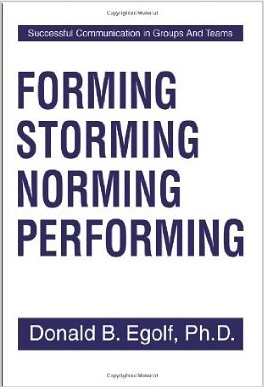 |
 |
Forming - Storming -
Norming � Performing
Team development theory.
|
 |
| |
First proposed in
1965 by Bruce Tuckman, an American psychologist, this has become one of
the best-known theories of team development. Tuckman�s theory focuses
on the way in which a team undertakes a project from the initial
formation of the team through to completion of the task.
|
|
| |
FORMING |
|
| |
When a team
is first brought together there is usually a degree of goodwill between
team members; they are keen to create a good impression (particularly on
a designated team leader) and will strive to avoid conflict or
controversy. Team members� behaviour is usually driven by a desire to
be accepted by others within the team. However, team members do not yet
know each other or individuals� capabilities, etc. Neither do they know
each other well enough to trust one another.
The focus of the team at this stage is
usually project-directed as they set about defining the task, collecting
information, making initial plans, etc.
During this phase, individuals are
gathering information about the scope of the task and forming opinions
about the best way to tackle it. They are also forming impressions of
their fellow team members and trying to gauge what their contribution
might be.
At this stage, team leaders need to be
quite directive � and team members will usually be co-operative but will
tend to act independently. Although goals may be agreed, the team may
not actually achieve very much.
|
|
| |
STORMING |
|
| |
This is the phase where the team really
starts to �get down to business� and team members will begin to put
forward suggestions regarding the best way to achieve the team�s
objectives. Because these are unlikely to coincide, there is the
likelihood of conflict as team members each seek to promote their own
ideas. Tuckman suggests that, although this phase can be a difficult or
uncomfortable one, it is a necessary one for the growth and development
of the team.
Team members may have formed different
concepts of the task to be achieved. They will almost certainly have
different ideas about the best way to proceed, the way in which the team
will function, individual responsibilities, etc.
Relationships between team members will
be made or broken in this phase and, unless it is well managed, this
phase can be destructive for the team. Effective team leaders (and
members) will emphasise the need for tolerance and it is often their
level of maturity (and emotional intelligence) that determines whether a
team moves beyond this phase.
If a team is too focused on achieving
consensus, however, they may agree to a plan which �keeps everybody
happy� but which is less effective in completing the task.
|
|
| |
NORMING |
|
| |
If teams can agree on a common
perception of the task before them and on the ways they will work
together, the team moves into this more harmonious phase. The team
becomes more familiar with the project (and feel less threatened by the
size of the task � and by each other).
Team members exhibit tolerance towards
each other and learn how to work together in harmony. Clearly defined
roles and responsibilities contribute to team members developing trust
in each other.
As team members get to know each other
better, their views of each other begin to change. They begin to
recognise each other�s professional (and personal) strengths. Ideally,
the team comes to recognise the vital contribution of each member and
individuals feel valued. This leads to increased motivation. As
individual team members take greater responsibility for their part in
the project, team leaders can take a step back from the team to become
less directive and more participative.
There is a risk that a more settled
approach may lead to complacency � and the creative drive that
characterised the storming phase may be lost.
Some members may feel overwhelmed by the
amount of responsibility they have been given. This can lead them to
revert to storming again.
|
|
| |
PERFORMING |
|
| |
Performing teams are
characterised by high levels of independence, motivation and
achievement. They are the teams that �get the job done� and will often
thrive on challenge. They are able to call upon the range of skills and
personal qualities exhibited within the team to cope with new problems.
They are able to self-manage, working without external supervision.
Team members
have become interdependent and decision-making
is collaborative. There is a high level of respect between team
members, communication is honest and differences are encouraged.
Performing teams recognise that diversity contributes to creative
problem solving.
Supervisors of the team during
this phase are almost always participative.
However, Tuckman warns that not all
teams will reach this phase. Furthermore, changing circumstances (such
as a change of leadership or in the composition of the team) can lead to
the team reverting to the storming stage.
|
|
| |
|
ADJOURNING & TRANSFORMING |
|
| |
|
Tuckman later recognised another phase
of team development during which the project is completed and the team
disbanded.
Some teams may experience a kind of
"mourning" as they acknowledge the end of an era. Enlightened managers
may arrange for some kind of celebratory event to mark the achievements
of the team. Team members often leave successful projects with fond
memories of their experience.
Sometimes a team may move into a
transforming phase in which new projects or goals are set and which
may involve the team readjusting roles and responsibilities. This is
achieved on the back of the respect that team members have for each
other.
The drawback is that such teams
frequently do not manage to capture the same "magic" as previously.
This is particularly the case when new members need to be drafted into
the team because of their knowledge or expertise. Although
performing teams can transform, in practice the team may
revert to the forming or storming stage.
|
|
| |
|
NORMING & RE-NORMING |
|
| |
|
It has been
suggested (by Timothy Biggs) that an additional stage be added to
Tuckman�s model. Biggs notes that there is often a stage after
forming where the performance of a group gradually improves (without
the team having undergone the storming process).
At this point, a
�diplomat� or �peace-maker� team leader, satisfied with the level of
performance, may prevent the team progressing through the storming
phase. Biggs suggests that this stage could be regarded as �norming�
� and the subsequent post-storming phase would then be seen as �re-norming�.
|
|
| |
 |
Forming, Storming, Norming,
Performing:
Successful Communication in
Groups and Teams
Donald B Egolf
< Click here to buy on Amazon |
|
|
|
| |
|
|
|
|
|
|
|